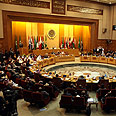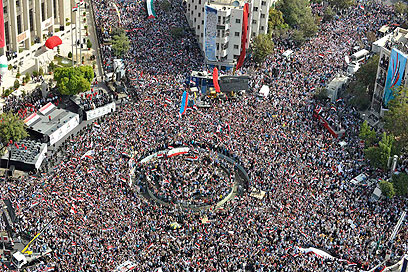
Arab foreign ministers met Sunday at the group's Cairo headquarters behind closed doors for an initial 3-hour session without Syria's representative, then took a break and reconvened for talks with Syrian diplomats that lasted late into the night.
Related stories:
- Syria: 36 killed in Friday clashes; 3,000 since March
Top Syria cleric threatens suicide attacks on US, EU
UK summons Syria envoy over dissident harassment
Just after the meeting with Syrian diplomats, Qatar Foreign Minister Hamad bin Jassim made no mention of a possible suspension and instead gave Syria a 15-day deadline to enact a cease-fire.
The Arab League also agreed to create a committee led by Qatar to oversee the situation in Syria and said a national dialogue between Syrian officials and the opposition would take place at the League's headquarters in Cairo.
Supportes of Bashar Assad at Damascus square on Friday (Photo: Reuters)
"A national dialogue in 15 days is one of the most important decisions of the day," bin Jassim said.
The national dialogue is to include members of the opposition from outside Syria as well as inside. If the meeting and a cease-fire do not take place within the allotted time frame, the Arab League will meet again in an emergency session, participants said.
Syrian state TV reported that Damascus was not eager to hold the dialogue in Cairo, suggesting it should be held in Syria instead.
The newly formed Syrian National Council, a broad based opposition umbrella group, was also seen unlikely to accept the call for dialogue, though some factions within the fragmented opposition who might be willing to hold talks.
Some activists rejected the idea of talks with Bashar Assad's regime.
"We said it from the day the first martyr fell: No dialogue with the killers. The killers will be put on trial by the free Syrian people," wrote prominent Syrian opposition figure Suhair Atassi on her Twitter feed. She is in hiding.
To suspend Syria's membership, at least two-thirds of the members would have had to support the measure. A bloc of six Gulf nations, including Saudi Arabia, was leading the push for the measure along with recognition of the opposition leadership, the Syrian National Council, said an Arab diplomat who spoke on condition of anonymity because he was not authorized to brief the media.
Many Gulf states, including Saudi Arabia, already have withdrawn their ambassadors from Syria to protest the regime's bloody response to the protests.
However, the diplomat said a significant bloc of countries was opposed, including Sudan, Algeria, Lebanon and Yemen, whose leader is also facing a serious uprising. According to Arab League diplomats, Mideast heavyweight Egypt did not indicate yet which side it is on.
Suspension of an Arab League member is rare. Although the move would not likely have a direct, tangible impact on Syria, it would constitute a major blow to President Bashar Assad's embattled regime by stripping Damascus of its Arab support and further deepening its isolation.
The group suspended Libya's membership earlier this year after Moammar Gadhafi's violent crackdown on protesters there, but has since reinstated Libya under the country's new leadership.
Syria's ambassador to the Arab League, Youssef Ahmad, held up a document he said was shared with the Arab foreign ministers. In it, he alleged, was proof that weapons from Israel had been found in Syria among the protesters.
"The Syrian opposition is also getting logistical support from Arab countries," he said in his public remarks to the body. The Syrian regime frequently claims outside forces are fomenting the violence. The opposition denies that, opposing foreign intervention.
The UN says more than 3,000 people have been killed since the uprising began in mid-March.
"Unfortunately the situation remains dangerous," Arab League Secretary-General Nabil Elaraby said.
During the meetings, about 2,000 anti-Assad protesters rallied outside the Arab League building on the edge of Cairo's Tahrir Square, the center of Egypt's uprising.
Despite the growing chorus for an end to the crisis, Assad has shown no sign of easing his campaign to crush the 7-month-old uprising. On Sunday, security forces opened fire on a funeral for a slain activist in the east.
Forces elsewhere arrested at least 44 people in the capital's suburbs in house-to-house raids and activists said more than 900 people in the central city of Homs had been detained over the past week.
- Follow Ynetnews on Facebook
- Receive Ynetnews updates
directly to your desktop
















